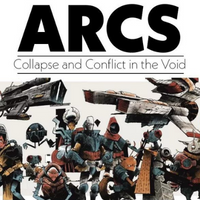01 January 2023
|
Ben Maddox tells us why we should give up on the plastic and embrace the humble cube
It’s a dangerous proclivity. It’s a proclivity bordering on a habit. It’s a habit bordering on a dependency. It’s a dependency bordering on a catastrophic addiction. An addiction that will consume us all in fire. An addiction that will drown us all in the sea.
Stuff.
Modern day economics seeks to atomise us. That way purveyors of useless tat can leverage our despair into fooling us that the way to solve our problems is to fill every available space in our homes with stuff. Not things that carry utilitarian or sentimental value but stuff. Stuff that will moulder away at the bottom of a drawer.
Why bother about Californian wildfires or Micronesian archipelagos being swallowed by the sea? This fidget spinner has plastic diamonds on it.
When I got into games a decade ago one of the most appealing factors was that it seemed an industry that was nice. It was a wonderful irony that an industry that specialised in making engines of competitiveness had a joyful bonhomie behind the scenes. Companies helped each other out and shared ideas. While this ethos still seems broadly intact the industry has transformed over the last ten years. The advent of professionalism has brought with it an arms race to grab the attention of the gamer. Production has far outstripped the amount of people coming into the hobby and, as the peacock’s tail gets ever bigger, game components have become more and more elaborate until it feels like the industry is starting to become unwieldy. Starting to stumble down an evolutionary cul-de-sac.
You may be reading this thinking that I’m falling into the inevitable middle aged trap of proposing that things were better in my day but it is undeniable that games have become something else over the last ten years.
CMON was the first, with Zombiecide, to start packaging games with Games Workshop standard miniatures. After this, games that required a visual verisimilitude would pack their boxes with mountains of grey plastic.
The runaway success of CMON spread through the industry like a contagion.
It was starting to feel, considering the state of the world, that the industry was getting into violin concertos during urban conflagrations.
I’ll give you a couple of examples. Firstly, Tapestry. Now there are many more games with much more plastic in the box but none are quite so blatant in the sheer ice cap melting pointlessness of it all. The game comes with oodles of massive, detailed buildings that serve no other function than to take up space on your player board. These could have easily been polyomino shaped pieces of punch board, but why have utility, when you can have table presence? Then we have the deluxe version of Castles of Burgundy.
Alea games feels like one of the holdouts. They produce games with flawless mechanisms and components that do their job. Castles of Burgundy is a fine example of this. Sure the player boards are thin and the art uninspiring but married with this truly masterful design the game sings. So why not take the lessons learned from this example, throw them out of the window, waste loads of oil on components we don’t need and charge the earth for it?
The irony of all this is that it’s all so unnecessary too. Games live in the mind. The stories they tell emerge out of mechanical interactions not out of a load of immobile PVC that you can’t even fit in the box properly.
I’m sure all of us have felt that queasy feeling. It’s a picture uploaded to social media. Someone standing next to their newly arrived Kickstarter game. It’s supposed to be celebratory but you can’t help but feel a little bit sick because the stack of boxes they are proudly showing off are as tall as them. This isn’t a game at this point. It is a middle finger, defiantly brandished at the Intergovernmental Commission on Climate Change. It is an admission that it’s not about gaming anymore, it’s about acquisition. About being able to throw your cash at things you don’t need and never use. When a hobby based on coming together loses sight of that core goal, when it becomes about how much you can own not how many memories you can create, it is robbed of its purpose, it’s robbed of its magic.
The great thing though is that we can change all this. By simply saying no. No to plastic inserts. No to miniatures the size of a newborn. No to stacks and stacks of content we will never see. We can engage our imaginations and revitalise our love for the hobby by opening our minds to something so simple, so iconic and so indicative of board games. We can change the world by embracing…the cube.
Looking for more?

This review came from Tabletop Gaming Magazine, which is home to all of the latest and greatest tabletop goodness. Whether you're a board gamer, card gamer, wargamer, RPG player or all of the above, find your copy here.
Get your magazine hereRead More...

If you want to read more about one of the most hotly anticipated games of the year, check out our interview with Cole Wehrle on ARCS! A new game from the designer of Root and Oath, and we've got all you need to know.
To infinity and beyond
Sometimes we may include links to online retailers, from which we might receive a commission if you make a purchase. Affiliate links do not influence editorial coverage and will only be used when covering relevant products








Comments
Login or register to add a comment